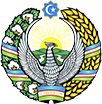Xaridlar
E'lon I-yarim yillik hisoboti 2022-yil I-chorak hisoboti 2022-yil II-chorak hisoboti 2022-yil III-chorak hisoboti 2023-yil I-chorak hisoboti 2023-yil II-chorak hisoboti 2023-yil III chorak hisoboti 2025 - yil I-chorak hisoboti 2025 - yil II-chorak hisoboti 2025-yil III-chorak hisoboti 2024-yil moliyaviy hisobot 2023-yil moliyaviy hisobot 2021-yil moliyaviy hisobot 2025-yil IV-chorak hisobotiKadr
VakansiyalarBog‘lanish
Telefon ma’lumotnomaChet elda amaliyot va qisqa muddatli kurslar
Professor-o‘qituvchilar va xodimlar uchun stajirovkalar Doktorant va mustaqil izlanuvchilar uchun stajirovkalar Yozgi va qishki maktablarMilliy va xalqaro NNTlar, xayriya tashkilotlari va boshqa tuzilmalar bilan xalqaro hamkorlik
2024-yil 1-2-chorak4. SIFATLI TA'LIM
Maktab o‘quvchilari bilan ishlash5. GENDER TENGLIGI
Ilm-fanda ayollar
- Rektor murojaati
- Maqsad va qadriyatlar
- Hisobotlar va taqdimotlar
- Logotip va xos uslub
- Muzey
- Universitetning ustuvor yo‘nalishi
- Universitet rivojlanishining strategik yo‘nalishlari
- Ekologik barqarorlik
- Yashil universitet
- Universitet tasvirlari
- Fakultetlar
- Boshqarmalar
- Markazlar
- Bo'limlar
- Kafedralar
- Yuridik klinika
- Talabalar turar joylari
- TDYU huzuridagi akademik litseylar
- Kengash
- Rektor
- Prorektorlar
- Rahbariyat qabuli
- Murojaatlar tahlili
- Litsenziya va akkreditatsiyalar
- Nizom
- Asosiy normativ-huquqiy hujjatlar
- Lokal hujjatlar
- Korrupsiyaga qarshi kurashish
- Raqamlar va ma’lumotlar
- Reytinglardagi o‘rinlar
- E'lon
- I-yarim yillik hisoboti
- 2022-yil I-chorak hisoboti
- 2022-yil II-chorak hisoboti
- 2022-yil III-chorak hisoboti
- 2023-yil I-chorak hisoboti
- 2023-yil II-chorak hisoboti
- 2023-yil III chorak hisoboti
- 2025 - yil I-chorak hisoboti
- 2025 - yil II-chorak hisoboti
- 2025-yil III-chorak hisoboti
- 2024-yil moliyaviy hisobot
- 2023-yil moliyaviy hisobot
- 2021-yil moliyaviy hisobot
- 2025-yil IV-chorak hisoboti
- Vakansiyalar
- Telefon ma’lumotnoma
Universitet
Universitet haqida
Universitet
Tarkibiy tuzilma
Boshqaruv organlari
Murojaatlar
Rasmiy hujjatlar
Ochiq ma’lumotlar
Yutuqlar
Xaridlar
Kadr
Bog‘lanish
Stakeholder engagement policy
- Bitiruvchilar ro‘yxati
- Bizning bitiruvchilar
Ta'lim
Bakalavriat
Magistratura mutaxassisliklari
Stipendiya va grantlar
Elektron kutubxona
Mashg‘ulotlar jadvali
Masofaviy ta'lim
Treninglar va mayner kurslar
Yakuniy davlat attestatsiyalari
Yuridik klinika
Street Law
O'quv dastur
O'quv reja
Malaka talablari
Bandlik va karyera
Xalqaro standartlar boʻyicha professional oʻqitish markazi
Aholi uchun ekspert maslahatlari
TDYU ekspertlari
Bitiruvchilar
Stipendiya va grantlar
Elektron kutubxona
Mashg‘ulotlar jadvali
Masofaviy ta'lim
Treninglar va mayner kurslar
Yakuniy davlat attestatsiyalari
Yuridik klinika
Street Law
O'quv dastur
O'quv reja
Malaka talablari
Bandlik va karyera
Xalqaro standartlar boʻyicha professional oʻqitish markazi
Aholi uchun ekspert maslahatlari
TDYU ekspertlari
Bitiruvchilar
Mashg‘ulotlar jadvali
Masofaviy ta'lim
Treninglar va mayner kurslar
Yakuniy davlat attestatsiyalari
Yuridik klinika
Street Law
O'quv dastur
O'quv reja
Malaka talablari
Bandlik va karyera
Xalqaro standartlar boʻyicha professional oʻqitish markazi
Aholi uchun ekspert maslahatlari
TDYU ekspertlari
Bitiruvchilar
Treninglar va mayner kurslar
Yakuniy davlat attestatsiyalari
Yuridik klinika
Street Law
O'quv dastur
O'quv reja
Malaka talablari
Bandlik va karyera
Xalqaro standartlar boʻyicha professional oʻqitish markazi
Aholi uchun ekspert maslahatlari
TDYU ekspertlari
Bitiruvchilar
Yuridik klinika
Street Law
O'quv dastur
O'quv reja
Malaka talablari
Bandlik va karyera
Xalqaro standartlar boʻyicha professional oʻqitish markazi
Aholi uchun ekspert maslahatlari
TDYU ekspertlari
Bitiruvchilar
O'quv dastur
O'quv reja
Malaka talablari
Bandlik va karyera
Xalqaro standartlar boʻyicha professional oʻqitish markazi
Aholi uchun ekspert maslahatlari
TDYU ekspertlari
Bitiruvchilar
Malaka talablari
Bandlik va karyera
Xalqaro standartlar boʻyicha professional oʻqitish markazi
Aholi uchun ekspert maslahatlari
TDYU ekspertlari
Bitiruvchilar
Xalqaro standartlar boʻyicha professional oʻqitish markazi
Aholi uchun ekspert maslahatlari
TDYU ekspertlari
Bitiruvchilar
TDYU ekspertlari
Bitiruvchilar
- Ilmiy maktablar faoliyati bo‘yicha ma'lumotnoma
- Umumiy ma’lumot
- Reytinglarda ishtirok
- Reytinglar OAVda
- Imtihon natijalari
- Savollar ro‘yxati
- Naoshi Sugiyama
Ilmiy-innovatsion faoliyat
Ilmiy faoliyat
Ilmiy kengashlar
Ilmiy maktablar
Ilmiy maktablar
Ilmiy nashrlar
Yosh olimlar kengashi
Ilmiy fond
Akademik innovatsiyalar fondi
Legal Tech laboratoriyasi
Ilmiy-innovatsion ishlanmalarni tijoratlashtirish
Huquqiy tashabbuslar
TDYU xalqaro reytinglarda
Ilmiy fond
Akademik innovatsiyalar fondi
Legal Tech laboratoriyasi
Ilmiy-innovatsion ishlanmalarni tijoratlashtirish
Huquqiy tashabbuslar
TDYU xalqaro reytinglarda
Legal Tech laboratoriyasi
Ilmiy-innovatsion ishlanmalarni tijoratlashtirish
Huquqiy tashabbuslar
TDYU xalqaro reytinglarda
Huquqiy tashabbuslar
TDYU xalqaro reytinglarda
Malakaviy imtixonlar
Ilmiy ishlanmalar natijalari
Xizmatlar
“Central Asian Legal Research Fellowship” almashinuv dasturi
Davlat ilmiy-texnik dasturlari doirasidagi grantlar
Patentlar
Akademik halollik va tadqiqot etikasi kodeksi
Konferentsiya materiallari
Maqsadli doktorantura va tayanch doktorantura
Xizmatlar
“Central Asian Legal Research Fellowship” almashinuv dasturi
Davlat ilmiy-texnik dasturlari doirasidagi grantlar
Patentlar
Akademik halollik va tadqiqot etikasi kodeksi
Konferentsiya materiallari
Maqsadli doktorantura va tayanch doktorantura
Davlat ilmiy-texnik dasturlari doirasidagi grantlar
Patentlar
Akademik halollik va tadqiqot etikasi kodeksi
Konferentsiya materiallari
Maqsadli doktorantura va tayanch doktorantura
Akademik halollik va tadqiqot etikasi kodeksi
Konferentsiya materiallari
Maqsadli doktorantura va tayanch doktorantura
Maqsadli doktorantura va tayanch doktorantura
Doktorantlar
Faxriy professorlar
- Hamkor xorijiy universitetlar
- Hamkor xorijiy tashkilotlar
- Xalqaro assotsiatsiyalarga a'zolik
- Xalqaro olimpiada va tanlovlar
- Xorijiy professorlar
- Xorijiy xizmat safarlari
- Qo'shma ta'lim dasturlari
- University Foundation Program o‘quv kursi
- Talabalar almashinuvi
- Professor-o‘qituvchilar almashinuvi
- Qo‘shma fakultetlar
- Xorijiy stajirovka hisobotlari — 2023
- Xorijiy stajirovka hisobotlari — 2024
- Xorijiy stajirovka hisobotlari — 2025
- Xalqaro konferensiya, seminar va davra suhbatlari
- Xalqaro ilmiy loyiha va grantlar
- Ekspertlar kengashi (vatandoshlar)
- Xalqaro stipendiyalar
- Hamkor OTMlar stipendiyalari
- Professor-o‘qituvchilar va xodimlar uchun stajirovkalar
- Doktorant va mustaqil izlanuvchilar uchun stajirovkalar
- Yozgi va qishki maktablar
- 2024-yil 1-2-chorak
Xalqaro faoliyat
Xalqaro aloqalar
Akademik mobillik
Ilmiy loyihalar
Chet elda amaliyot va qisqa muddatli kurslar
Markaziy Osiyo talabalar kongressi
Milliy va xalqaro NNTlar, xayriya tashkilotlari va boshqa tuzilmalar bilan xalqaro hamkorlik
Talabalar hayoti
Ijtimoiy faollikni rag'batlantirish
Talabalar birlashmalari
Ijodiy studiya va klublar
Talabalar sport klublari
Ilmiy maktablar va to‘garaklar
Talabalar festivali
Stipendiyalar
Olimpiadalar
Talabalar turar joyi
Tibbiy markaz
Ovqatlanish joylari
Kitob do’koni
Yoshlar ittifoqi TDYU boshlang’ich tashkiloti
Yoshlar Parlamenti
Ma'naviyat
Ekofaol talabalar
Ijtimoiy faollik indeksi
Faol talabalar reyestri
Kelajakka qadam
Ijodiy studiya va klublar
Talabalar sport klublari
Ilmiy maktablar va to‘garaklar
Talabalar festivali
Stipendiyalar
Olimpiadalar
Talabalar turar joyi
Tibbiy markaz
Ovqatlanish joylari
Kitob do’koni
Yoshlar ittifoqi TDYU boshlang’ich tashkiloti
Yoshlar Parlamenti
Ma'naviyat
Ekofaol talabalar
Ijtimoiy faollik indeksi
Faol talabalar reyestri
Kelajakka qadam
Ilmiy maktablar va to‘garaklar
Talabalar festivali
Stipendiyalar
Olimpiadalar
Talabalar turar joyi
Tibbiy markaz
Ovqatlanish joylari
Kitob do’koni
Yoshlar ittifoqi TDYU boshlang’ich tashkiloti
Yoshlar Parlamenti
Ma'naviyat
Ekofaol talabalar
Ijtimoiy faollik indeksi
Faol talabalar reyestri
Kelajakka qadam
Stipendiyalar
Olimpiadalar
Talabalar turar joyi
Tibbiy markaz
Ovqatlanish joylari
Kitob do’koni
Yoshlar ittifoqi TDYU boshlang’ich tashkiloti
Yoshlar Parlamenti
Ma'naviyat
Ekofaol talabalar
Ijtimoiy faollik indeksi
Faol talabalar reyestri
Kelajakka qadam
Talabalar turar joyi
Tibbiy markaz
Ovqatlanish joylari
Kitob do’koni
Yoshlar ittifoqi TDYU boshlang’ich tashkiloti
Yoshlar Parlamenti
Ma'naviyat
Ekofaol talabalar
Ijtimoiy faollik indeksi
Faol talabalar reyestri
Kelajakka qadam
Ovqatlanish joylari
Kitob do’koni
Yoshlar ittifoqi TDYU boshlang’ich tashkiloti
Yoshlar Parlamenti
Ma'naviyat
Ekofaol talabalar
Ijtimoiy faollik indeksi
Faol talabalar reyestri
Kelajakka qadam
Yoshlar ittifoqi TDYU boshlang’ich tashkiloti
Yoshlar Parlamenti
Ma'naviyat
Ekofaol talabalar
Ijtimoiy faollik indeksi
Faol talabalar reyestri
Kelajakka qadam
Ma'naviyat
Ekofaol talabalar
Ijtimoiy faollik indeksi
Faol talabalar reyestri
Kelajakka qadam
Ijtimoiy faollik indeksi
Faol talabalar reyestri
Kelajakka qadam
Kelajakka qadam
Qabul 2025
Qabul komissiyasi faoliyati
Bakalavriat taʼlim yo‘nalishi
Magistratura mutaxassisligi
Qo‘shma taʼlim dasturlari asosida o‘qishga qabul qilish
Yuridik texnikum bitiruvchilarini o‘qishga qabul qilish
Xorijiy fuqarolarni o‘qishga qabul qilish
Qabul jarayoniga oid eʼlonlar
Yuridik litsey bitiruvchilarini o‘qishga qabul qilish
Talabalar o'qishini ko'chirish va qayta tiklash masalalari
Ko'zi ojiz abituriyentlarni o'qishga qabul qilish
Iqtisodiyot tarmoqlarida kamida besh yil ish stajiga ega bo‘lgan fuqarolarni o‘qishga qabul qilish bo‘yicha o‘tkazilgan suhbat natijalari
Toshkent davlat yuridik universitetiga 2025/2026-o'quv yili uchun tabaqalashtirilgan to'lov-kontrakt miqdorlari
Magistratura mutaxassisligi
Qo‘shma taʼlim dasturlari asosida o‘qishga qabul qilish
Yuridik texnikum bitiruvchilarini o‘qishga qabul qilish
Xorijiy fuqarolarni o‘qishga qabul qilish
Qabul jarayoniga oid eʼlonlar
Yuridik litsey bitiruvchilarini o‘qishga qabul qilish
Talabalar o'qishini ko'chirish va qayta tiklash masalalari
Ko'zi ojiz abituriyentlarni o'qishga qabul qilish
Iqtisodiyot tarmoqlarida kamida besh yil ish stajiga ega bo‘lgan fuqarolarni o‘qishga qabul qilish bo‘yicha o‘tkazilgan suhbat natijalari
Toshkent davlat yuridik universitetiga 2025/2026-o'quv yili uchun tabaqalashtirilgan to'lov-kontrakt miqdorlari
Yuridik texnikum bitiruvchilarini o‘qishga qabul qilish
Xorijiy fuqarolarni o‘qishga qabul qilish
Qabul jarayoniga oid eʼlonlar
Yuridik litsey bitiruvchilarini o‘qishga qabul qilish
Talabalar o'qishini ko'chirish va qayta tiklash masalalari
Ko'zi ojiz abituriyentlarni o'qishga qabul qilish
Iqtisodiyot tarmoqlarida kamida besh yil ish stajiga ega bo‘lgan fuqarolarni o‘qishga qabul qilish bo‘yicha o‘tkazilgan suhbat natijalari
Toshkent davlat yuridik universitetiga 2025/2026-o'quv yili uchun tabaqalashtirilgan to'lov-kontrakt miqdorlari
Qabul jarayoniga oid eʼlonlar
Yuridik litsey bitiruvchilarini o‘qishga qabul qilish
Talabalar o'qishini ko'chirish va qayta tiklash masalalari
Ko'zi ojiz abituriyentlarni o'qishga qabul qilish
Iqtisodiyot tarmoqlarida kamida besh yil ish stajiga ega bo‘lgan fuqarolarni o‘qishga qabul qilish bo‘yicha o‘tkazilgan suhbat natijalari
Toshkent davlat yuridik universitetiga 2025/2026-o'quv yili uchun tabaqalashtirilgan to'lov-kontrakt miqdorlari
Talabalar o'qishini ko'chirish va qayta tiklash masalalari
Ko'zi ojiz abituriyentlarni o'qishga qabul qilish
Iqtisodiyot tarmoqlarida kamida besh yil ish stajiga ega bo‘lgan fuqarolarni o‘qishga qabul qilish bo‘yicha o‘tkazilgan suhbat natijalari
Toshkent davlat yuridik universitetiga 2025/2026-o'quv yili uchun tabaqalashtirilgan to'lov-kontrakt miqdorlari
Iqtisodiyot tarmoqlarida kamida besh yil ish stajiga ega bo‘lgan fuqarolarni o‘qishga qabul qilish bo‘yicha o‘tkazilgan suhbat natijalari
Toshkent davlat yuridik universitetiga 2025/2026-o'quv yili uchun tabaqalashtirilgan to'lov-kontrakt miqdorlari
- Maktab o‘quvchilari bilan ishlash
- Ilm-fanda ayollar
SDG
1. QASHSHOQLIKKA BARHAM BERISH
2. OCHLIKKA BARHAM BERISH
3. SOG’LIQ VA FAROVONLIK
4. SIFATLI TA'LIM
3. SOG’LIQ VA FAROVONLIK
4. SIFATLI TA'LIM
5. GENDER TENGLIGI
6. TOZA SUV VA SANITARIYA
7. ARZON VA TOZA ENERGIYA
8. MUNOSIB ISH O‘RINLARI VA IQTISODIY O‘SISH
9. SANOATLASHTIRISH, INNOVATSIYA VA INFRASTRUKTURA
10. TENGSIZLIKNI KAMAYTIRISH
11. BARQAROR SHAHARLAR VA AHOLI YASHASH JOYLARI
12. SAMARALI ISTE’MOL VA ISHLAB CHIQARISH
13. IQLIM O‘ZGARISHIGA QARSHI KURASHISH
14. DENGIZ EKOTIZMLARINI ASRASH
15. QURUQLIKDAGI EKOTIZIMLARNI ASRASH
16. TINCHLIK, ADOLAT VA SAMARALI BOSHQARUV
17. BARQAROR RIVOJLANISH YO‘LIDA HAMKORLIK
8. MUNOSIB ISH O‘RINLARI VA IQTISODIY O‘SISH
9. SANOATLASHTIRISH, INNOVATSIYA VA INFRASTRUKTURA
10. TENGSIZLIKNI KAMAYTIRISH
11. BARQAROR SHAHARLAR VA AHOLI YASHASH JOYLARI
12. SAMARALI ISTE’MOL VA ISHLAB CHIQARISH
13. IQLIM O‘ZGARISHIGA QARSHI KURASHISH
14. DENGIZ EKOTIZMLARINI ASRASH
15. QURUQLIKDAGI EKOTIZIMLARNI ASRASH
16. TINCHLIK, ADOLAT VA SAMARALI BOSHQARUV
17. BARQAROR RIVOJLANISH YO‘LIDA HAMKORLIK
10. TENGSIZLIKNI KAMAYTIRISH
11. BARQAROR SHAHARLAR VA AHOLI YASHASH JOYLARI
12. SAMARALI ISTE’MOL VA ISHLAB CHIQARISH
13. IQLIM O‘ZGARISHIGA QARSHI KURASHISH
14. DENGIZ EKOTIZMLARINI ASRASH
15. QURUQLIKDAGI EKOTIZIMLARNI ASRASH
16. TINCHLIK, ADOLAT VA SAMARALI BOSHQARUV
17. BARQAROR RIVOJLANISH YO‘LIDA HAMKORLIK
12. SAMARALI ISTE’MOL VA ISHLAB CHIQARISH
13. IQLIM O‘ZGARISHIGA QARSHI KURASHISH
14. DENGIZ EKOTIZMLARINI ASRASH
15. QURUQLIKDAGI EKOTIZIMLARNI ASRASH
16. TINCHLIK, ADOLAT VA SAMARALI BOSHQARUV
17. BARQAROR RIVOJLANISH YO‘LIDA HAMKORLIK
14. DENGIZ EKOTIZMLARINI ASRASH
15. QURUQLIKDAGI EKOTIZIMLARNI ASRASH
16. TINCHLIK, ADOLAT VA SAMARALI BOSHQARUV
17. BARQAROR RIVOJLANISH YO‘LIDA HAMKORLIK
16. TINCHLIK, ADOLAT VA SAMARALI BOSHQARUV
17. BARQAROR RIVOJLANISH YO‘LIDA HAMKORLIK

- Elektron kutubxona
- E-universitet
- Masofaviy ta'lim
- Mashg‘ulotlar jadvali
- Xorijiy talabalarga
- Stipendiya va grantlar
- Talabalarga xizmat ko'rsatish markazi
- Street Law
- Akademik mobillik
- Xorijiy professorlar
- Treninglar va mayner kurslar
- Klub va to‘garaklar, mahorat darslari va festivallar
- Murojat qilish
- Korruptsiyaga qarshi kurash usullari
- Ta’lim grantlari
- Toshkent davlat yuridik universitetida kiyinish tartibi
Talabalar uchun
Sustainable procurement / purchasing policy.
Tashkent State Law University's sustainable procurement policy outlines the guidelines and principles that govern the institution's purchasing activities with a focus on environmental, social, and ethical considerations. The policy aims to integrate sustainability into the procurement process, ensuring that goods, services, and construction projects are acquired in a manner that minimizes negative environmental and social impacts while supporting sustainable practices. Here are the key components typically found in a university sustainable procurement policy.
Policy Statement
Tashkent State Law University is committed to sustainable procurement. It is important to consider environmental, social and ethical factors in all purchasing decisions.
Objectives: Specific objectives of the University's sustainable procurement policy include reducing its carbon footprint, promoting fair labor practices, supporting local businesses and minimizing waste generation. For example, in order to maximize recycling activities in the University's waste recycling program, colorful waste bins have been installed on campus, and special colored bins for plastic, paper, and other types of waste have been installed.
New containers around the campus:



Any waste, such as batteries and lightbulbs are also put separately as they cannot be disposed off as the normal trash.
State Unitary Enterprise “Makhsustrans” (Special Transport) has started processing organic waste. Work is underway with Green International on this project. For this, a land plot has been allocated near Tashkent. “Makhsustrans” (Special Transport) brings sorted organic waste from markets, restaurants and other facilities.

Here the waste is re-sorted, added to straw, leaves or special manure, collected in rows using German technology and dried within 6 weeks. The leaves are regularly mixed on a specially imported combine harvester from Germany. After six weeks, the ideal fertilizer is ready.
Gardeners and farmers can use this natural and reliable product on their farms.
Tashkent State University of Law has signed a number of agreements with “Makhsustrans” in support of this activity. Through this partnership, TSUL continues to intensify its activities in line with the United Nations Sustainable Development Goals.

Tashkent State Law University's Sustainable Procurement Policy is a set of official guidelines and principles governing the institution's procurement of goods, services and construction projects, with a strong focus on sustainability, environmental responsibility and social impact. The policy aims to integrate sustainable practices into the university's purchasing decisions, ensuring that purchased products and services meet the institution's environmental commitments, social equity and ethical standards. Here are the key components typically found in a university's sustainable procurement policy.
Objectives: Specific objectives of the sustainable procurement policy include reducing the university's environmental impact, supporting local communities and businesses, promoting fair labor practices and supporting sustainable innovation.
Program to Reduce the Use of Paper and Plastic on Campus
The university has done a number of things to reduce the use of paper and plastic products. In particular, enterprises and organizations wishing to cooperate with the university must first of all accept the condition of non-use of paper and plastic products, after which a service agreement can be concluded between the university and the enterprise or organization. For example, the use of paper and plastic products on the territory of the university by all three enterprises (organizations) that cooperate with the university and produce and supply food products on its territory is prohibited by mutual agreement.
The work issued to university employees is distributed on the basis of a separate invoice and a justified document, which avoids unnecessary paperwork.
In addition, to reduce the use of paper, electronic document management was introduced among university employees. This is done through a single portal, av.ijro.uz. Even students can receive any document they own (payment agreements, certificates, etc.) through a separate electronic system.

In addition, the HR platform (app ijro, https://adm.ijro.uz/auth) was opened individually for employees and professors of the University. Through this platform, teachers send applications and all documents online to the rector and the Ministry of Justice. The University practically does not use papers, since all fields are administered electronically. (done online)

The university library offers books that can be electronically downloaded with QR codes.
Additional evidence link:
https://tsul.uz/en/euc-system-card
https://library-tsul.uz
https://app.ijro.uz/auth

University has a special program for reduce the plastic impact on environment.
Local and Small Business Support. Tashkent State Law University encourages purchases from local and small businesses to support the local economy, reduce transportation-related emissions, and promote community development. For example, Tashkent state University of Law has all the conditions for the convenience of teachers and students without harming the environment. The campus has a variety of safe bikes and electric scooters for comfortable movement. Special deceleration equipment is installed in crowded places. Most importantly, these techniques are free for all students and have special discounts for their family members.




Green Building and Construction: Priority is given to building projects that adhere to green building standards and promote energy efficiency, renewable energy and sustainable materials.
Engagement and collaboration: Collaborate with suppliers and stakeholders to identify innovative sustainable solutions and drive continuous improvement in sustainable practices.
The administration and responsible staff of the Tashkent State University of Law systematically monitor the reduction in energy use. The university tries to implement the latest technological advances in such a way that the effectiveness of their implementation does not have a negative impact on the health of students and university staff.



Over the past 5 years, the Tashkent State University of Law has been widely introducing LED lighting, street lamps that work on solar energy, and energy-efficient table clamps. Solar panels are located on the rooftops of the university buildings, which provide the university with additional alternative energy all year round.


To this end, the university has its own central air and water heating and cooling systems. Tashkent State University of Law integrated development programs and roadmaps will greatly influence the introduction, use, expansion and improvement of sustainable energy-efficient technologies.


Energy Efficient Appliances Usage: Solar Power Generation System and Energy saving heating system (Tashkent State University of Law, Uzbekistan)
Today there are new, modern types of air conditioning systems with direct expansion of air for large rooms, which are more efficient and economical. Along with this, centralized air conditioning systems with an intermediate refrigerant are gaining more and more popularity, one of which is the chiller-fan coil system. Tashkent State University of Law uses this particular system to cool the university premises. The length of our system is 10778 m.

